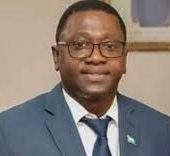By Hassan Osman Kargbo
The Ministry of Finance, through its Public Debt Management Division, has commenced a five-day workshop to update Sierra Leone’s Medium-Term Debt Strategy (MTDS) for 2025–2029. The exercise, which began Monday, 8th September 2025, is taking place at Leisure Lodge in Aberdeen, Kallon Drive, Freetown.
The workshop brings together a wide range of stakeholders, including representatives from the Bank of Sierra Leone, the National Revenue Authority, Statistics Sierra Leone, the National Minerals Agency, the University of Sierra Leone, and Civil Society Organisations (CSOs).
According to the Director of the Public Debt Management Division, Mathew Sandy, the MTDS serves as a key tool for managing the cost and risk of the country’s debt portfolio over the medium term. He explained that the update is being carried out within a framework that has been agreed with international partners such as the World Bank and the International Monetary Fund (IMF).
“We are using the composition of the debt stock to assess the cost and risk of the existing debt, as well as the degree of exposure,” Sandy said. “Over the next five days, we will review past performance, assess the current baseline, and analyse other relevant data before recommending the best option to cabinet for sustainable debt management.”
Sandy stressed that the updated strategy will guide the government in managing borrowing decisions while ensuring that debt remains within sustainable limits. He added that aligning borrowing practices with long-term economic goals is critical for stabilising the economy and protecting future generations.
In her opening statement, the Deputy Minister of Finance, Mrs. Kadiatu Allie, reiterated the government’s commitment to achieving economic stability through sound debt management. She said that the previous debt strategy approved in 2023 had already laid the foundation for a more disciplined, transparent, and forward-looking approach to public debt management.
“Our focus is on ensuring that public debt translates into tangible benefits for citizens, particularly through investments in agriculture, education, infrastructure, and livelihoods,” she noted.
Madam Allie underscored that updating the MTDS for 2025–2029 provides an important platform for stakeholders to deepen their understanding of financial sustainability, strengthen risk management practices, and promote responsible borrowing. She added that government’s priority is to ensure that public resources are managed prudently while addressing the country’s developmental needs.
Observers say the exercise comes at a crucial time, as Sierra Leone continues to navigate the twin challenges of rising expenditure pressures and limited fiscal space. The country has faced growing demands for public investment in critical sectors such as healthcare, education, and infrastructure, while also grappling with external shocks that have strained the economy.
Stakeholders at the workshop are expected to review not only the structure of the country’s debt portfolio but also the broader economic environment. Their recommendations will inform cabinet decisions on borrowing limits, repayment timelines, and priority investment areas for the coming years.
The Ministry of Finance believes that a carefully updated debt strategy will help the country strike a balance between financing development needs and maintaining debt sustainability, ultimately laying a stronger foundation for inclusive economic growth.











